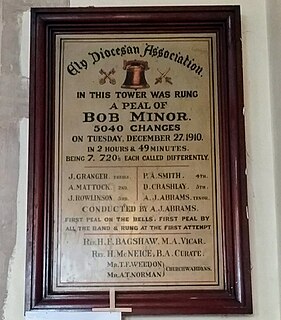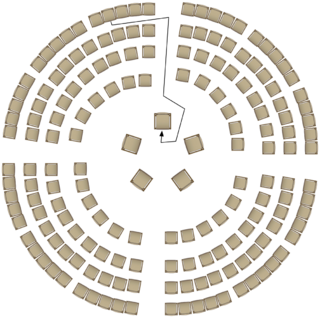
Speed geeking is a participation process used to quickly view a number of presentations within a fixed period of time. Speed geeking gets its name from speed dating, since they both employ similar techniques.

Speed geeking is a participation process used to quickly view a number of presentations within a fixed period of time. Speed geeking gets its name from speed dating, since they both employ similar techniques.
A large room is selected as the speed geeking venue. All the presenters are arranged in a large circle along the edge of the room. The remaining members of the audience stand at the center of the room. Ideally there are about 6-7 audience members for each presenter. One person acts as the facilitator.
The facilitator rings a bell to start proceedings. Once proceedings start, the audience splits up into groups and each group goes to one of the presenters. Presenters have a short duration, usually 5 minutes, to give their presentation and answer questions. At the end of the five minutes, the facilitator rings a bell. At this point, each group moves over to the presenter to their right and the timer starts once more. The session ends when every group has attended all the presentations.

Change ringing is the art of ringing a set of tuned bells in a tightly controlled manner to produce precise variations in their successive striking sequences, known as "changes". This can be by method ringing in which the ringers commit to memory the rules for generating each change, or by call changes, where the ringers are instructed how to generate each change by instructions from a conductor. This creates a form of bell music which cannot be discerned as a conventional melody, but is a series of mathematical sequences.
In computing, a presentation program is a software package used to display information in the form of a slide show. It has three major functions:
In some countries of the Commonwealth realm, a division bell is a bell rung in or around a parliament to signal a division to members of the relevant chamber so that they may take part. They may also be used to signal the start or end of parliamentary proceedings, and often produce different sounds or coloured lights to identify the chamber affected.
Extemporaneous Speaking is a speech delivery style/speaking style, and a term that identifies a specific forensic competition. The competition is a speech event based on research and original analysis, done with a limited-preparation; in the United States those competitions are held for high school and college students. In a Extemporaneous Speech competition, enrolled participants prepare for thirty minutes on a question related to current events and then give a seven-minute speech responding to that question. The extemporaneous speaking delivery style, referred to as “off-the-cuff”, is a type of delivery method for a public presentation, that was carefully prepared and practiced but not memorized.

Fort Boyard is a French game show created by Jacques Antoine that was first broadcast on 7 July 1990. Foreign versions of the show, with varying success, have aired around the world since 1990.

CITV is a British free-to-air children's television channel owned by ITV plc. It broadcasts content from the CITV archive and acquisitions, every day from 6 am to 9 pm which was previously 6 am to 6 pm until 21 February 2016. It is also the title of a programming block on the ITV network at weekends.
Method ringing is a form of change ringing in which the ringers commit to memory the rules for generating each change of sequence, and pairs of bells are affected. This creates a form of bell music which is continually changing, but which cannot be discerned as a conventional melody. It is a way of sounding continually changing mathematical permutations.

Russian Orthodox bell ringing has a history starting from the baptism of Rus in 988 and plays an important role in the traditions of the Russian Orthodox Church.

A "ring of bells" is the name bell ringers give to a set of bells hung for English full circle ringing. The term "peal of bells" is often used, though peal also refers to a change ringing performance of more than about 5,000 changes.

In campanology, a peal is the special name given to a specific type of performance of change ringing which meets certain exacting conditions for duration, complexity and quality.
Audience response is a type of interaction associated with the use of audience response systems, to create interactivity between a presenter and its audience.

PechaKucha is a storytelling format where a presenter shows 20 slides for 20 seconds of commentary each. At a PechaKucha Night, individuals gather at a venue to share personal presentations about their work. The PechaKucha format can be used, for example, in business presentations to clients or staff, as well as in education settings.
"Vexation and Venture" is a conference format designed so problems and dilemmas are presented within small groups in an interactive format. Key components of this conference format include:

A fishbowl conversation is a form of dialog that can be used when discussing topics within large groups. Fishbowl conversations are sometimes also used in participatory events such as unconferences. The advantage of fishbowl is that it allows the entire group to participate in a conversation. Several people can join the discussion.
Document cameras, also known as visual presenters, visualizers, digital overheads, or docucams, are real-time image capture devices for displaying an object to a large audience. Like an opaque projector, a document camera is able to magnify and project the images of actual, three-dimensional objects, as well as transparencies. They are, in essence, high resolution web cams, mounted on arms so as to facilitate their placement over a page. This allows a teacher, lecturer or presenter to write on a sheet of paper or to display a two or three-dimensional object while the audience watches. Theoretically, all objects can be displayed by a document camera. Most objects are simply placed under the camera. The camera takes the picture which in turn produces a live picture using a projector or monitor. Different types of document camera/visualizer allow great flexibility in terms of placement of objects. Larger objects, for example, can simply be placed in front of the camera and the camera rotated as necessary,or a ceiling mounted document camera can also be used to allow a larger working area to be used.
Speed networking is a meeting format designed to accelerate business contacts.
A projection booth, projection box or Bio box is a room or enclosure for the machinery required for the display of movies on a reflective screen, located high on the back wall of the presentation space. It is common in a movie theater.
An EdCamp is a participant-driven conference – commonly referred to as an "unconference". EdCamps are designed to provide participant-driven professional development for K-12 educators. EdCamps are modeled after BarCamps, free participant-driven conferences with a primary focus on technology and computers. Educational technology is a common topic area for EdCamps, as are pedagogy, practical examples in instructional use of modern tools, and solving the problems technology can introduce into the classroom environment.
A debate chamber is a room for people to discuss and debate. Debate chambers are used in governmental and educational bodies, such as a parliament, congress, city council, or a university, either for formal proceedings or for informal discourse, such as a deliberative assembly. When used for legislative purposes, a debate chamber may also be known as a council chamber, legislative chamber, or similar term. Some countries, such as New Zealand, use the term debating chamber as a formal name for the room that houses the national legislature.
The Challenge: All Stars is a special limited-series of the reality competition show The Challenge. It features twenty-two past cast members of the show competing for $500,000.